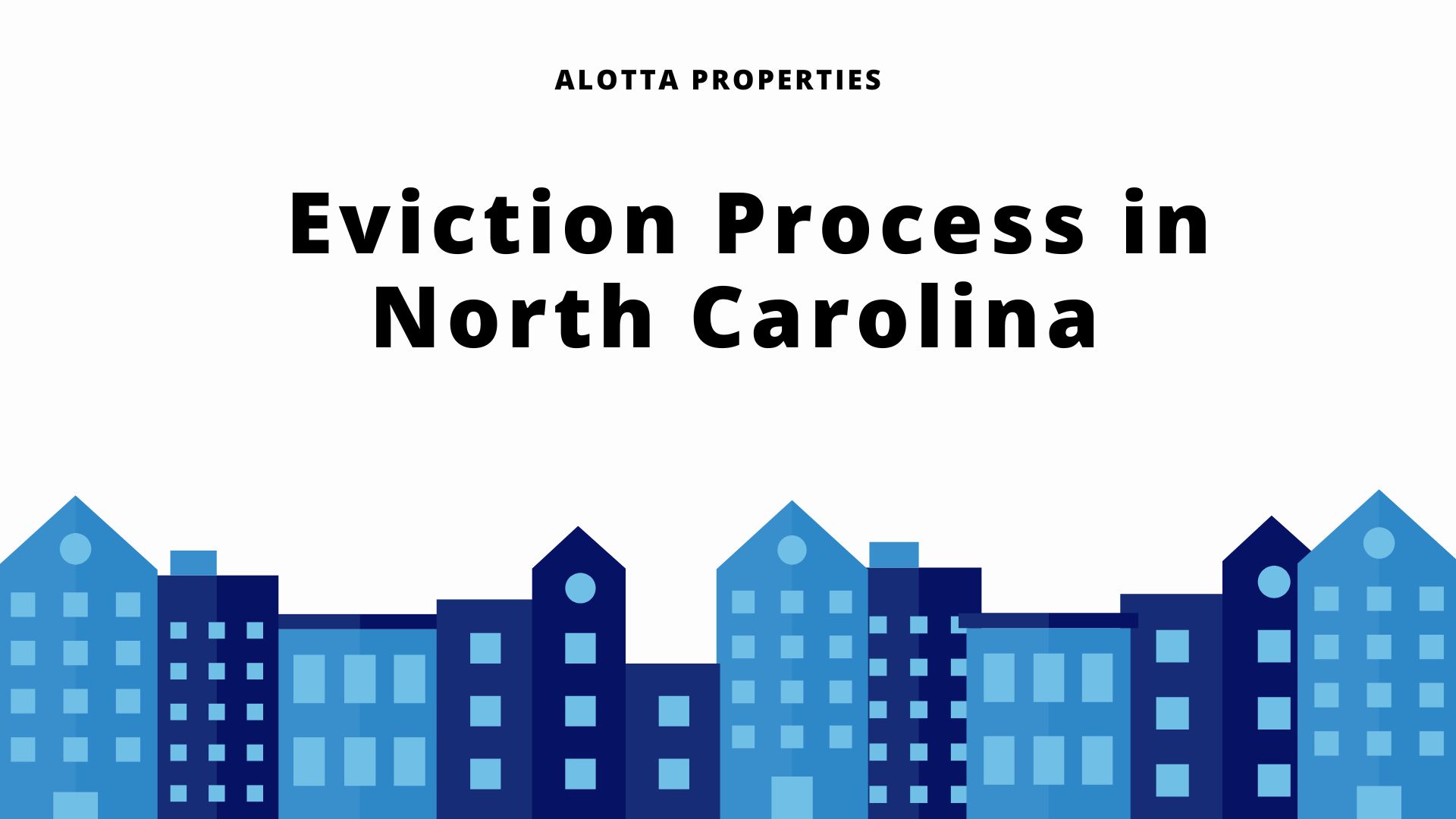Under Landlord-Tenant law, landlords have the right to evict tenants. However, it can only be done through a judicial process. You cannot evict a tenant as a form of retaliation or on the basis of a protected class, such as race, color, religion, or familial status.
You also cannot remove a tenant using your own methods. For example, locking the tenant out of the unit, removing their belongings, or shutting down their utilities. Only a court can order the removal of a tenant in North Carolina.
Removing a tenant from their rented property takes one to three months. The process may take longer if a tenant files an appeal after a judgment.
While it can differ from county to county, the following is more or less the same process that all North Carolina both the landlord and tenant must follow.
1. Serving an Eviction Notice
To begin the North Carolina eviction process, you must first end the lease agreement. This is where an eviction notice comes in. Different notices serve different purposes. Make sure to use the correct one, or your tenant may use that as a defense against their removal.

- Nonpayment of Rent: To begin the eviction proceedings against a tenant for past due rent, you must serve them a ten-day “Notice to Quit.” This written notice period informs the tenant that they have 10 days to move out if they withhold paying rent. If the tenant does not pay the amount within 10 days, you can file a complaint with the court.
Lease Agreement Violations: This is another common violation. When a tenant signs a rental or lease agreement, they abide by certain rules. Which may include not subletting the unit illegally, not keeping an unauthorized pet, not smoking inside the unit, or not making illegal rental property alterations.
Unfortunately, some tenants end up going against the very document they promised to uphold. And in such a case, North Carolina law empowers you to evict them. (N.C. Gen. Stat. § 42-11.) Unlike in most other states, landlords are not required to give their tenant a second chance to cure the violation prior to evicting them from their property.
No Lease/End of Lease: Landlords in North Carolina can also evict their renters for holding over after their lease has expired. Similar to other violations, you must notify them before starting the eviction process.
The amount of notice to offer tenants depends on the type of tenancy. For tenants that pay rent on a weekly basis, you must serve them a 2-Day Notice to Quit. For tenants that pay rent on a monthly basis, you must serve them a 7-Day Notice to Quit. And for tenants on a year-to-year tenancy, you must serve them a 30-Day Notice to Quit.

If the tenant fails to vacate the property after the notice has expired, you can move to court and file for their removal.
Illegal Activity: You are not required to give proper notice for a tenant that has been involved in illegal activity. In the state of North Carolina, illegal activity is defined in one of two ways; Criminal activity that affects a tenant’s safety, health, or quiet enjoyment, or the illegal use, sale, possession, or manufacture of controlled substances.
If a tenant has committed any of these illegal activities, you must proceed to the next step immediately.
2. Eviction Filing and Serving a Complaint
This is the next step in the tenant eviction process in North Carolina. If a landlord files a complaint due to a tenant not honoring the notice, you must move to an appropriate court. If the value of the eviction case is under $10,000, you will most likely file the complaint with the Small Claims Court or the District Court.
Unlike an eviction notice, a summons and complaint must be served to the tenant via a process server. A common process server is a county sheriff's office.

The summons and complaint must be served to the tenant within 5 days after successful filing with the court.
3. Attending the Court Hearing and Awaiting Judgment
If you file the eviction lawsuit in a Small Claims Court, the matter could be heard within 7 days after successfully issuing the summons.
In a District Court, the eviction hearing could be held within 30 days if it is expedited. Non-expedited hearings will take much longer.
If the tenant does not show up for the eviction hearing, the court may render a default judgment in your favor. However, if they choose to show up, they may defend their eviction by alleging the following.
You tried to evict them through your own means, such as locking them out of the rental property.
You tried to evict them because of their race, color, religion, nationality, disability, or any other protected class stated in the Fair Housing Act.
You failed in your maintenance responsibilities even after being served appropriate notices.
You tried to evict the tenant for reporting you to a relevant government agency for action.
4. Issuance of the Writ of Possession
If the judgment is in your favor, the court will issue you a writ of possession. This will be your tenant’s final notice to leave. The purpose of the writ is to give the tenant an opportunity to remove their belongings before they can be forcefully removed from the rental property.
Normally, the writ of possession is issued 10 days after a successful eviction ruling. Bear in mind, however, that a tenant has a right to appeal the judgment which may give them more time to stay in the property.
After a successful eviction, you will want to ensure that you take care of the removal and court costs associated as outlined in the North Carolina Security Deposit Law.
Disclaimer: This blog isn’t a substitute for professional legal advice from a qualified attorney. Also, laws change and this information may not be updated at the time of your reading. If you have any question regarding the North Carolina eviction process or any other aspect of NC landlord-tenant laws, Alotta Properties can help.


